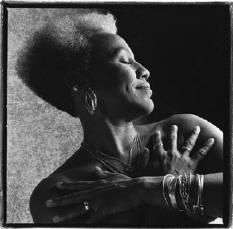 Gaye Adegbalola Gaye Adegbalola
(Ah-deg-bah-lo-la)
Blueswoman
Gaye Adegbalola
(Ah-deg-bah-lo-la) began her music career playing the flute
while in high school and was chosen for the All-State band three
years straight. In 1977, Gaye began taking guitar lessons from
Ann Rabson and devoted more of her time to solo performing. "I
had always played in my bedroom late at night after my son went
to sleep," she says. "Then push came to shove. He had a lot of
eye surgery and I needed a second job, and it was either
flinging burgers or playing music. I played three nights a week
in a local bar for 25 bucks a night, and that's what started the
ball rolling."
In 1984, Gaye and Ann formed a blues duo, and Saffire--The
Uppity Blues Women took form. Gaye plays guitar, harmonica and
sings vocals with the group. By 1988 Gaye turned that
$25-a-night gig into a full-time job. Then, in 1992, came
another curveball: She developed cancer. Unable to tour heavily,
she was resigned to scaling back her career when she received an
unexpected boost from her idol, veteran guitarist Rory Block.
With Block to produce, Gaye had no trouble convincing her record
company to get behind a solo album. In 1990 Gaye received a W.C.
Handy Award for "Song Of The Year," for her composition The
Middle Age Boogie Blues.
Gaye's philosophy is summed up on the CD Bitter Sweet Blues by
two seemingly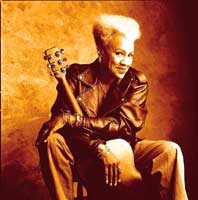 contradictory songs. "Big Ovaries, Baby," a brawny declaration
of female power, reveals the grit of a woman whose adopted last
name means "I'm reclaiming my royalty" in Nigerian. But the hymn
"Let Go, Let God" expresses the adaptive spirit that's guided
Adegbalola down her diverse paths. In her 55 years Adegbalola
has been a street-corner civil rights activist, the director of
a small theater, a biochemical researcher, a mother, the state
of Virginia's Teacher of the Year, and now a blueswoman.
contradictory songs. "Big Ovaries, Baby," a brawny declaration
of female power, reveals the grit of a woman whose adopted last
name means "I'm reclaiming my royalty" in Nigerian. But the hymn
"Let Go, Let God" expresses the adaptive spirit that's guided
Adegbalola down her diverse paths. In her 55 years Adegbalola
has been a street-corner civil rights activist, the director of
a small theater, a biochemical researcher, a mother, the state
of Virginia's Teacher of the Year, and now a blueswoman.
Gaye Adegbalola was born, raised, and now lives in
Fredericksburg, Virginia, with her life partner Suzanne.
Fredericksburg is a small town of approximately twenty-thousand
people near Washington, D.C. "Early on" states Gaye, "when I
grew up, of course things were quite segregated. So, I lived
with the whole inferiority that segregation brings and I grew to
overcome that. But because of how things were, the whole black
community was quite close-knit and the whole black part of town
felt like family.
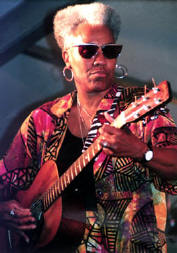 My mother
and my father were community leaders. So I had them as my
examples and everything was wonderful." Having gone through the
sit-ins and the Civil Rights movement, Gaye states "I came out
of that and went into the Black Power movement. I felt that I
really needed to define what I fought for and was it really
important to fight to go to a bathroom beside somebody or was it
really important to fight for rights to vote. So it helped me to
be courageous. It helped me to look my adversaries in the eye.
It also helped me to pick and choose my battles. You know you
can't win 'em all and you can't fight 'em all. So you have to
decide where you put your energy. And you always have to be
honest." My mother
and my father were community leaders. So I had them as my
examples and everything was wonderful." Having gone through the
sit-ins and the Civil Rights movement, Gaye states "I came out
of that and went into the Black Power movement. I felt that I
really needed to define what I fought for and was it really
important to fight to go to a bathroom beside somebody or was it
really important to fight for rights to vote. So it helped me to
be courageous. It helped me to look my adversaries in the eye.
It also helped me to pick and choose my battles. You know you
can't win 'em all and you can't fight 'em all. So you have to
decide where you put your energy. And you always have to be
honest."
Gaye graduated valedictorian from
her high school and went to Boston University where she received
a bachelor's degree in biology and chemistry. Gaye then worked
in New York City for a number of years as a biochemical
researcher and then a bacteriologist.
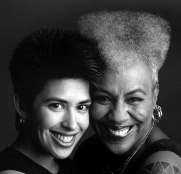 Gaye met
her life partner, Suzanne, in 1991. When asked when she came to
the realization she was gay, she responds "Oh god, I guess I've
known it since I was a bab y. It was something that I've fought
all my life because it wasn't socially acceptable and it was the
last thing in the world that you wanted to be. So, as I came up,
I knew I had these feelings in me. I mean I knew as a kid that I
was a "Tomboy" but it was just something I fought. I fought. I
guess in my teen and young adult years, I dated lots of men,
trying to get it out of my system. I guess after I married,
shortly thereafter, I realized that I was living a lie. Between
then and when I finally settled down with Suzanne, I had a few
relationships with women that were really meaningful BUT, as
long as I was raising my son and living in small town
ultra-conservative Fredericksburg, Virginia, I knew that I was
not going to make a total commitment to a woman. I did not have
the wherewithal to be open, and out, and my son be a minor.
Plus, I was teaching school at the time. So I was very, very
closeted. And it's a sad thing considering that I consider
myself a strong woman, and a courageous woman. But I did not
want to put any more weight on him than was needed." Gaye met
her life partner, Suzanne, in 1991. When asked when she came to
the realization she was gay, she responds "Oh god, I guess I've
known it since I was a bab y. It was something that I've fought
all my life because it wasn't socially acceptable and it was the
last thing in the world that you wanted to be. So, as I came up,
I knew I had these feelings in me. I mean I knew as a kid that I
was a "Tomboy" but it was just something I fought. I fought. I
guess in my teen and young adult years, I dated lots of men,
trying to get it out of my system. I guess after I married,
shortly thereafter, I realized that I was living a lie. Between
then and when I finally settled down with Suzanne, I had a few
relationships with women that were really meaningful BUT, as
long as I was raising my son and living in small town
ultra-conservative Fredericksburg, Virginia, I knew that I was
not going to make a total commitment to a woman. I did not have
the wherewithal to be open, and out, and my son be a minor.
Plus, I was teaching school at the time. So I was very, very
closeted. And it's a sad thing considering that I consider
myself a strong woman, and a courageous woman. But I did not
want to put any more weight on him than was needed."
When asked how her son deals with
her being a lesbian, Gaye states "We are doing just fine. It
took a lot of conversation. It took a lot of understanding. And
I think, he too has been brought up all his life with such a
fear of homosexuality. I mean the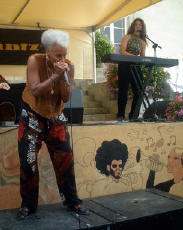 black community is quite homophobic. Small town Virginia is
quite homophobic. So he had to grow in his understanding and he
has really come to respect my relationship. It wasn't always the
same. I guess if you notice from our picture (on Gaye's web
site), Suzanne is quite younger than I am. So that was another
problem that we had that he had to adjust to because she's
closer to his age than to my age. So there was some obstacles.
It's no joke. There was some major obstacles but we took our
time because we love each other so dearly and we grew in
understanding."
black community is quite homophobic. Small town Virginia is
quite homophobic. So he had to grow in his understanding and he
has really come to respect my relationship. It wasn't always the
same. I guess if you notice from our picture (on Gaye's web
site), Suzanne is quite younger than I am. So that was another
problem that we had that he had to adjust to because she's
closer to his age than to my age. So there was some obstacles.
It's no joke. There was some major obstacles but we took our
time because we love each other so dearly and we grew in
understanding."
Gaye attributes much of the
homophobia in the Black community to facing "so many issues and
so many battles. I don't know. I really don't know. The black
church is such an institution in our community and probably half
of the black choir directors and piano players in these churches
are gay but it's not like 'Welcome, welcome, come here'. It's
just 'Let's not talk about this.'"
In 1992, Gaye was hit with the
news of the big "C." "I thought that I was all so well and good,
and feeling strong, and very much in love. I had met Suzanne in
'91. Then I found out that I had two primary cancers. I am
blessed to say that they got it all surgically, and I guess I
should knock on wood right here, right now. What happened after
I had the surgery and all, I guess about a week or so later, is
my internal stitches broke and I hemorrhaged for about a day. I
came out of it okay but I also came out of it with fibromyalgia,
which is chronic muscle pain, and I had to cut back on touring
and really make some changes in my lifestyle. Also, I had to
make some changes in my philosophies. So I'm just real glad to
be here. Some days, it's hard to walk. Other days, it's hard to
talk. Sometimes, you're in what we call 'Fibro Fog'. It's like
the pain is so intense, you can't think straight. You can't
focus. But I've learned how to cope with it. I just can't work
like I used to. I can't perform like I used to."
Gaye is still - probably first and foremost - a "blueswoman,"
says she doesn't know "the cultural or political workings of the
lesbian community as well as she should," but the important
thing is that she is "comfortable" with who she is. "My music is
honest." Being out affords her a degree of freedom, a sense of
feeling "cleaner."
With a genuine and unstoppable
smile, she says, "It's one of the best things that has ever
happened" to her. And, she adds, at the risk of stating the
obvious, "[at least out] lesbians are REALLY happy."
Gaye's new CD, Bitter Sweet Blues, is thoroughly
entertaining and enjoyable and it has allowed her to express her
homosexuality and feelings about coming out, themes she's kept
muted until now. "Recently a lesbian who's seen a lot of our
shows came running up to me and was just thrilled that now I was
hers-that I was standing up and sticking out," she says. "I just
figured it was about time." "The blues," says Gaye, "is the
music of an oppressed people." Though she and Saffire have
always had a large lesbian following, as an out lesbian, Gaye
will no doubt multiply that following. "Bringing the blues to
gay and lesbian people," she explains, "will heal a lot of
people." That is the power of the blues, and that is certainly a
need within the GLBT community.
Be sure to check out Gaye's web site at:
http://www.adegbalola.com
Source:
www.technodyke.com |